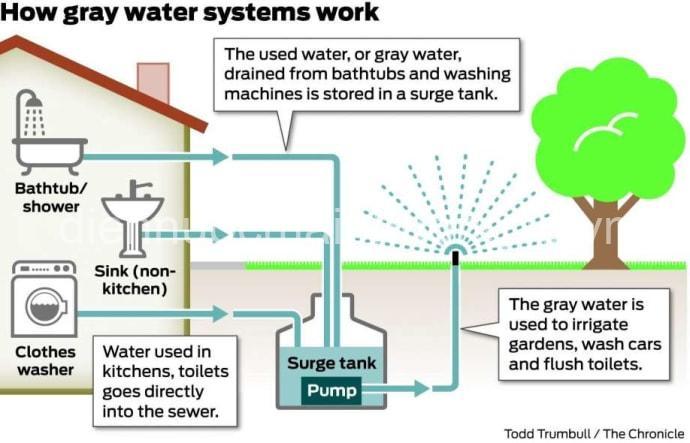Water knowledge
Greywater Recycling Systems: How They Work & Benefits | diennuocmaiphuong.io.vn
Greywater Recycling Systems: How They Work & Benefits | diennuocmaiphuong.io.vn. In today’s article, diennuocmaiphuong.io.vn will explore with you in the most detailed and complete way. See now!
How Greywater Recycling Systems Work
Greywater recycling systems are designed to capture and reuse the wastewater generated from sinks, showers, bathtubs, and washing machines, known as greywater. This water is typically collected, filtered, and treated before being used for various purposes like irrigating gardens or flushing toilets.
Let’s break down the process:
-
Defining Greywater: Greywater is different from blackwater, which comes from toilets and contains harmful bacteria. Greywater is generally safe for reuse after proper treatment, as it mainly comprises soap residues and other biodegradable materials.
-
Greywater Sources: Common sources of greywater include:
- Sinks: Kitchen and bathroom sinks.
- Showers and Bathtubs: Water used for showering and bathing.
- Washing Machines: Wastewater from laundry cycles.
-
Greywater System Components: A typical greywater recycling system consists of several key components:
- Collection: Dedicated greywater piping collects water from sources and directs it to a holding tank.
- Storage: Tanks, typically made of plastic or concrete, store the greywater before it is treated or used.
- Filtration and Treatment: This step is crucial for removing contaminants like soap residue and other debris. Filters and treatment methods can vary depending on the system design and intended use.
- Distribution: Piping systems distribute the treated greywater to the designated points of use.
-
Types of Greywater Systems: Greywater systems come in various forms, each suited for specific applications:
- Surface Irrigation: This is a simple and affordable method that involves directly irrigating plants with greywater. It’s well-suited for landscapes and gardens.
- Subsurface Drip Irrigation: A more efficient method where treated greywater is delivered directly to plant roots via a drip system, reducing evaporation losses.
- Greywater Filters and Treatment Systems: These systems employ advanced filtration and treatment technologies to produce higher-quality greywater for use in toilet flushing or other applications.
- Greywater Flushing Toilets: Some greywater systems are specifically designed to use treated greywater for toilet flushing, further reducing water consumption.
-
How Each System Works:
- Surface Irrigation: Greywater is collected and channeled to the garden beds.
- Subsurface Drip Irrigation: A network of perforated pipes distributes treated greywater directly to the plant roots, minimizing water loss.
- Greywater Filters and Treatment Systems: These systems use a combination of filters, settling tanks, and disinfection processes to eliminate harmful bacteria and contaminants.
- Greywater Flushing Toilets: Treated greywater is piped to the toilet tank, replacing potable water for flushing purposes.

Benefits of Greywater Recycling Systems
Greywater recycling offers numerous benefits, making it a valuable solution for water conservation and sustainability:
-
Water Conservation: By reusing greywater, you significantly reduce the amount of potable water needed for various tasks, easing the strain on precious water resources.
-
Environmental Benefits: By diverting greywater from the municipal wastewater treatment system, you reduce the amount of wastewater discharged into the environment, minimizing pollution and strain on water treatment facilities.
-
Cost Savings: Using greywater reduces your reliance on municipal water, leading to lower water bills and long-term cost savings.
-
Increased Water Independence: In regions prone to water scarcity or droughts, greywater recycling systems can offer a reliable source of water, enhancing resilience and independence.
Considerations for Implementing Greywater Recycling
Before you embark on installing a greywater system, consider these factors:
-
Local Regulations: Check with your local authorities to understand any permits or restrictions regarding greywater systems.
-
System Suitability: Evaluate whether a greywater system is suitable for your home, considering factors like climate, water quality, and your water usage patterns.
-
Maintenance and Monitoring: Greywater systems require regular maintenance, including cleaning filters and monitoring water quality to ensure safe and effective operation.
-
Potential Risks and Drawbacks:
- Contamination: Proper filtration and treatment are essential to avoid contamination.
- Odors: Some greywater systems can generate unpleasant odors, especially if not properly maintained.
DIY Greywater Recycling Systems
Building a simple greywater system for surface irrigation or drip irrigation can be a rewarding DIY project. However, it’s crucial to prioritize safety and adhere to design principles:
-
Simple DIY Systems: Focus on basic systems like surface irrigation or drip irrigation, avoiding complex filter and treatment systems.
-
Design Considerations: Prioritize safety by selecting appropriate materials, ensuring proper drainage, and protecting against backflow to the potable water system.
-
Resources and Guides: Seek reliable information and guidelines from reputable sources to guide you in building a safe and effective greywater system.
Professional Greywater System Installation
For more complex or advanced greywater systems, professional installation is often recommended:
-
Advantages of Professional Installation:
- Expertise: Professionals have the expertise to design and install systems that meet your specific needs and comply with regulations.
- Warranty: Professional installers typically offer warranties for their work, providing peace of mind.
- Compliance: Professionals ensure that your greywater system meets all local codes and regulations.
-
Finding Reputable Installers:
- Research and Reviews: Read online reviews and seek recommendations from other homeowners.
- Credentials and Licenses: Check for proper credentials and licenses to ensure the installer’s expertise.
-
System Design and Maintenance Contracts:
- Professional Design: A well-designed system is crucial for effective operation and longevity.
- Maintenance Contracts: Consider maintenance contracts to ensure your system is regularly serviced and operating optimally.
The Future of Greywater Recycling
Greywater recycling is constantly evolving, with new technologies and innovations emerging:
-
Innovations in Greywater Treatment Technologies: Advanced filtration and treatment methods are being developed to produce higher-quality greywater for broader applications.
-
Smart Home Integration: Greywater systems are increasingly integrating with smart home technology for automated monitoring, control, and optimization.
-
Community-Level Greywater Recycling: As communities grapple with water scarcity, larger-scale greywater recycling projects are being explored to address the collective needs of residents.
Greywater Recycling FAQs
What are the potential risks of greywater recycling?
* Greywater recycling involves potential risks, mainly contamination and odor. It’s crucial to ensure proper filtration and treatment to eliminate harmful bacteria and debris. Regular maintenance is essential to prevent odor buildup.
Is greywater recycling legal in my area?
* Regulations regarding greywater systems vary from place to place. It’s important to check with your local authorities to understand the specific requirements and restrictions in your region.
Can I use greywater for drinking?
* Greywater is not suitable for drinking or cooking, as it can contain contaminants. Always use potable water for those purposes.
How often do I need to maintain my greywater system?
* Maintenance requirements depend on the specific system and your water usage patterns. Typically, regular inspections, cleaning filters, and monitoring water quality are essential for optimal operation.
What are the best resources for learning about greywater recycling?
* Many resources are available for understanding greywater systems, including online websites, articles, and books. Contacting local environmental organizations or water conservation groups can also provide valuable information.
Conclusion
Greywater recycling offers a simple yet powerful way to conserve water, protect the environment, and save money. By implementing a greywater system, you can contribute to a more sustainable future. Consider your options and consult with professionals to determine the best system for your needs.
For more information about water-saving products and solutions, visit Jessica David Rodriguez, the owner of diennuocmaiphuong.io.vn and explore our wide selection of electrical and plumbing products. We are committed to providing the best quality products and resources to help you conserve water and create a more sustainable lifestyle.
We encourage you to share your thoughts and experiences with greywater recycling in the comments below. Share this article with your friends and family to spread awareness about this essential practice.
